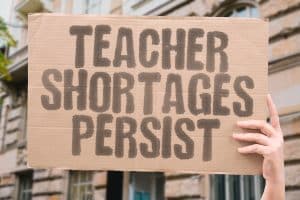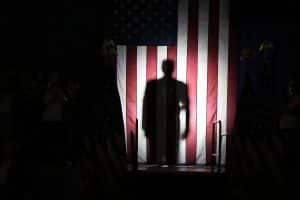In the 2024 Presidential Election, Donald Trump made significant gains among young men. Fifty-six percent of men under 30 cast their vote for Trump, a 15 percent increase from 2020.
Commenters have argued that the reach of the so-called “Manosphere” — an amorphous network of online influencers with large followings of young men — drove this rightward shift. From extreme misogynists like Andrew Tate to strong, masculine figures like Joe Rogan and comedians like Theo Von, such influencers speak to their young male followers who feel society has failed to address their needs and concerns. On the eve of the election, Trump spoke directly to these young men by conducting interviews with influencers on podcasts boasting millions of listeners.
Those in the Manosphere speak to issues ranging from young men’s loneliness and depression to economic insecurities (noted as another major factor which pushed young people to Trump) through self-help messages, dating tips, fitness guidance, and financial advice meant to bolster one’s confidence in his masculinity. These messages range from innocuous encouragement to deeply problematic rhetoric which radicalizes young men (and teenagers) into hatefulness and a belief that the world is rigged against them.
Many Manosphere influencers juxtapose men’s struggles with the rise of feminism. If women are gaining ground, the logic holds, men must be losing ground.
Despite the fact that large and complex shifts in social, economic, and cultural systems are overwhelmingly responsible for the problems young men encounter, Manosphere influencers have tapped into a sentiment that is already stubbornly popular. Indeed, recent research suggests anti-women attitudes among young men often follow circumstances which cause economic insecurity, such as high unemployment rates.
At a time when many young men are pessimistic about their socioeconomic opportunities, it is perhaps not surprising that significant numbers have latched onto anti-feminism. Indeed, these ideas have spread beyond the West to countries like China, South Korea, and the Philippines.
As a historian of working-class men, I want to argue, by exploring two notable examples, that shifts in male voting as a result of anti-feminist backlash are not a new phenomenon in the United States, and that historical parallels typically emerge from the same wellspring as today: many men throughout history, fearful of transformations in American society, point the finger at others, and women frequently shoulder a large chunk of the mislaid blame.
Placing the 2024 election in a historical context can provide a greater understanding of why anti-feminist sentiment has gained popularity in recent years, and how these attitudes have the ability to effect electoral shifts.
Anti-Suffrage Sentiment in the Early-20th Century
Organized suffrage movements — advocating for a woman’s right to vote — began in the 1840s, with individual states granting women’s suffrage as early as 1869. By the 1890s, the movement grew strong enough to push for a constitutional amendment guaranteeing the vote nationwide. Anti-suffrage forces, however, mounted staunch resistance and succeeded in delaying a constitutional amendment until 1920.
The reason many opposed suffrage stemmed largely from three areas: Prohibition, paternalism, and Jim Crow. Many women supported the prohibition of alcohol, and Americans feared suffrage would immediately bring a prohibition amendment. Many American men held paternalistic ideas that voting was a man’s right and woman’s duty was in the home, and felt suffrage would upset traditional gender roles. Southerners likewise feared that women voters would chip away at their suppression of Black voting rights and overturn the oppressive racial order.
Powerful interests ranging from brewers and saloon keepers to politicians and a relatively small number of elite women led Anti-suffrage campaigns, but working-class men formed the backbone of the movement.
READ: Male Supremacy Is at the Core of Hard Right’s Agenda
In a society where their prospects were already limited, working-class men feared women’s suffrage would bring more unwanted social changes and upend their place in society. Workers in urban areas feared women voters would drive away saloons and other forms of entertainment such as burlesque shows; those in the South deeply feared upsetting the racial order; and a huge number of men clung to their paternalistic authority in the household.
These anti-feminist attitudes drove voting trends. At the local and state level, monied interests and politicians convinced male voters to kill referendums on suffrage. Woodrow Wilson won the presidency in 1912 partially as a result of his stance that suffrage should be left up to the states. Their efforts ultimately failed, but it wasn’t for want of trying.
The parallels to 2024 are abundantly clear.
“Reagan Democrats” and Anti-Feminism
The 1970s was a decade of social and economic upheaval for urban, blue-collar workers. The process of “deindustrialization” drained many high-paying jobs in American cities, most notably in Detroit’s automobile industry. At the same time, white, working-class men felt left behind by the “Rights Revolution” of the 1960s and 70s, a time when marginalized groups such as African-Americans and LGBTQ people achieved significant progress toward equality.
While these men had historically voted Democrat, many shifted their allegiance to Ronald Reagan during the 1980 presidential election campaign, helping to sweep him into office and form a coalition which kept Republicans in power until 1992. Many of Reagan’s policies exacerbated wealth inequality and crushed unions, but the so-called “Reagan Democrats” often supported his reversal of liberal 1970s social policies.
INTERVIEW: After Misogyny: How the Law Fails Women and What to Do about It, with Julie C. Suk
One large factor which prompted this electoral shift was the rise of second-wave feminism in the 1970s.
Working-class men in 1980 were wary of feminists’ crusade to gain equal footing in American society, fearing such goals would upset traditional gender norms and paternalistic authority. Feminists’ liberal views on abortion, birth control, and sex also conflicted with many mens’ social conservatism and religious beliefs (they shared these attitudes with conservative women). At a time when working-class mens’ socioeconomic power was declining, feminism felt like an added affront.
From anti-suffragists to Reagan Democrats to “Manosphere” followers, attacking women’s rights movements have masked fears about men’s place in a changing society. Such misplaced anger is detrimental to many who embrace it, as it distracts from larger societal issues holding them back.
Recognizing the salience of this trend throughout history is an important step toward countering it in the present day.






